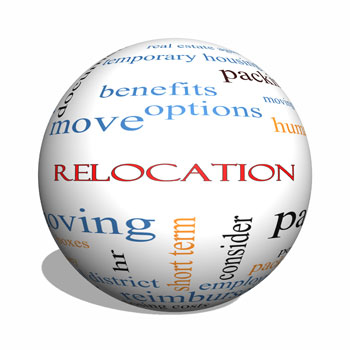Job Relocation Costs: It Often Costs Much More than You Think to Pick Up and Leave
Post Views 6When is a raise not a raise? When migrating professionals on the rise fail to calculate relocation costs with their eyes wide open. The hefty financial burden of relocating extends far beyond moving expenses (a general rule of thumb is that it costs a typical family anywhere from $25,000 to $75,000 to relocate their home – http://www.money-zine.com/career-development/finding-a-job/job-relocation-expenses/). Keep in mind: real estate closing fees (an average $6,747), travel, temporary lodging, and home-finding expeditions (just under $3,000). Not to mention cost-of-living differences, local or state tax changes, and many other critical factors.
Executive Christine Armstrong got a dose of relocation reality when she recently left San Diego for notoriously housing-tight San Francisco. “When people negotiate salary,” Armstrong says, “they should get realistic about the rental market and how far they’ll commute with respect to gas prices. Car insurance rates are higher in the Bay Area, plus moving fees, plus the cost of using online rental listing sites.
“Potentially, there’s the hiring of a rental agent, which can cost the equivalent of one month’s rent. In addition, in San Francisco, you may have to pay an extra security deposit if you have pets. We paid $2,000 extra for our two cats, which I hadn’t predicted.” The upshot, according to Armstrong, is that a double-digit percentage increase in pay just about covered the move.
Many employees are facing similar situations. Experts advise professionals to consider taking the following steps–and committing a few resources–to help make the experience less financially overwhelming.
Do your homework. Figure out all conceivable expenses, go beyond just those associated with packing furniture. Some of these expenses are obvious: If you’re leaving New York City and exclusively use the subway, you should plan on buying a car. Some are not obvious: If you’re heading from a warm-weather climate into a cold one, you need to account for added clothing needs. Spiffy sweaters, turtlenecks, and fine wool coats aren’t exactly cheap.
One of the biggest mistakes relocatees make is not spending enough time in the new location before the move. They are unprepared for what hits them. A weekend looking over the new city while the company is courting you is not enough. Perhaps you can commute for a few months prior to moving, or spend a vacation there with the intent on viewing it as the locals do. Remember: if you do scout it out quickly, that does not represent how the new location will be all year long.
If you don’t have the time to spend extended periods in a new city, conduct due diligence with future co-workers who already live there.Much like a company does a reference check, as a job candidate, I would not be shy at all about asking the company for several employees who have relocated recently to the area. They should be able to give you a better picture of the true cost. What seems like a huge increase can rapidly disappear once you factor in the difference. The cost of education, for example, can be substantial. Especially if you have kids in public schools, and you have to move them into private schools.
Also, beware of low-ball movers’ estimates. If they sound too good to be true, make sure they’re binding. Michael Brown, an executive who recently moved from Atlanta to Portland, OR, advises relocatees to look into the estimate details. “Moving companies are notorious for giving a non-binding, low-ball estimate,” he says. “Uninformed consumers then select the lowest bidder, have their belongings packed up and shipped, only to be blown away with a bill that can be two or three times bigger than anticipated.”
Negotiate the relocation just like a raise. Many employers are willing to make concessions they otherwise wouldn’t. So it’s best to take advantage of the employee-friendly climate. Hidden costs like temporary housing, phone deposits, and perhaps even increased golf club membership fees are all subject to discussion. Frankly, there is nothing diplomatic about it. If an employer expects you to move, they should not be shocked when the question arises.
Use online resources. A salary calculator allows you to find out how much you should make in your new city to maintain your current lifestyle. City, community, and school reports help you compare demographics, lifestyle, and education key-points, as well as provide helpful local contact information.
A Taxing Experience
While most executives are more aware of the pitfalls than they have been in the past, one area transferees still fail to consider is the tax aspects of the move. Most people are surprised to find that income taxes will be one of the highest costs incurred for the move.
Among the many unforeseen pitfalls are taxes on home sales and increases in state/local taxes. Also, the skyrocketing national housing market has prompted many professionals to dip into retirement accounts in order to cough up a decent down payment. But, because of taxes on gains and early withdrawal penalties, they are only able to use 50 percent of their hard-earned savings. Depending on the circumstances, it is possible that a proposed raise may not result in an increased standard of living due to increased costs.
Where can you find the most jobs? Click here.
Job Relocation Costs: It Often Costs Much More than You Think to Pick Up and Leave by Harrison Barnes



 How to Get Consulting Jobs and What it is Like Being a Consultant
How to Get Consulting Jobs and What it is Like Being a Consultant  Which Celebrities are Police Officers on the Side?
Which Celebrities are Police Officers on the Side?  Top 10 Tips for Changing Careers
Top 10 Tips for Changing Careers  Top 11 Trends in Employment of Church Pastors
Top 11 Trends in Employment of Church Pastors  How to Get Blacklisted from a Job Opportunity
How to Get Blacklisted from a Job Opportunity  Happy 2010!
Happy 2010!  Thanksgiving Advice for Communication Skills
Thanksgiving Advice for Communication Skills  How to Ask Your Boss a Touchy Question
How to Ask Your Boss a Touchy Question